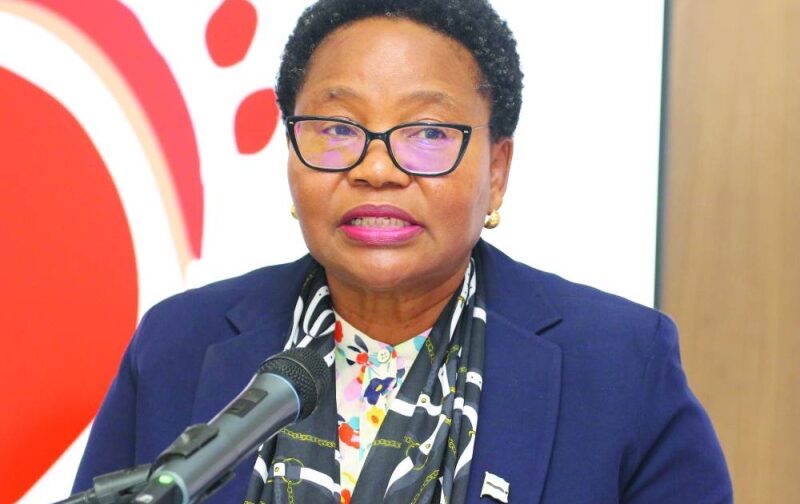- Choma Southern Province
- (260) 97 711 140

The minister was giving high-level reflections with her colleagues in the KAZA region. The theme of the reflections was ‘What Will It Take To Further Strengthen KAZA TFCA Governance And Development To Ensure Conservation And Development Impacts On The Ground’. Makwinja cited the Community-Based National Resource Management (CBNRM) Bill, which she said was crafted with the notion of empowering communities through the requisite beneficiation to the grassroots. The bill is still being finalised but it has attracted controversy from communities living in wildlife areas, who say the consultation is not being properly done. The law, Makwinja said, will ensure that communities participate in harnessing benefits derived directly from the environments they live in. “Governance structures are able to measure what we do,” she said reiterating that the idea has been that Botswana comes up with laws and policies that directly benefit communities and strengthen the KAZA TFCA. Makwinja further said ensuring that there are proper governance structures also helps in evaluating the benefits. “In our endeavours to improve or develop communities, we talk about sustenance development. We talk about trade issues, the importance of climate change,” the minister told the summit. Without further elaborating, the minister, who is sitting in for the substantive environment and Tourism minister, Dumezweni Mthimkhulu who is currently in the Bahamas on other official duties said: “Women in KAZA bear the brunt despite that they are in the majority. “KAZA has to ensure that people benefit from the government interventions.” For her part, the Zimbabwean Minister of Environment, Forestry, Climate and Wildlife, Sthembiso Nyoni, expressed optimism at the commitment by KAZA member states. “This is the first meeting where all invited ministers have attended. “This really shows that our member states are really committed to the KAZA agenda,” she said. Nyoni told the summit that the local structures should be empowered to be able to implement KAZA’s planned programmes. She stressed that KAZA as a region has to stand on its own and devise a funding model that will be suitable for its needs without stringent conditions from donors and partners that might compromise the intentions of the region. “KAZA can finance and manage its resources as a unit and via collaboration of member states through uniform programmes,” she stressed. The host nation’s Minister of Tourism, Rodney Sikumba who also chairs the ministers’ committee, stressed that it is not always possible for KAZA ministers to effectively meet to deliberate pertinent regional issues that can birth positive results for the KAZA region. “It’s normally not easy for the ministers to share a roof together for a full day,” Sikumba said, touching on the concerns shared earlier by the Zimbabwean minister. He further raised a concern about the stockpiled ivory in the region which has been differently indexed, with some coming from the hands of poachers, while others are from animals that died through natural causes. His point was that the KAZA area should benefit from the sale of ivory to mitigate issues of conservation and empowerment of local communities. Sikumba holds the view that the region should be equally managing the pricing of its natural resources as a collective including proper management of the stockpiles. “It’s a matter we need to take up with SADC and COMESA,” stressed Sikumba. The minister also shared the region’s frustrations with the looming food crisis and energy deficiencies as a result of the El Niño effects. He stated that 2.2 million grains planted this season were lost. In mitigation of the impending crisis Sikumba suggested that although the matter featured in the SADC Heads of State’s recent meeting, it is also important for relevant ministers to act promptly to prevent disaster from further crippling the region. He further boldly told donors and partners that some of the projects they fund are only good for the donors and partners and not necessarily for the region. “We want to encourage you (donors and partners) that as you continue supporting us, this should be able to empower us to move towards standing on our own,” he said to thunderous applause from the summit. Namibia’s Minister of Environment, Forestry and Tourism Pohamba Shifeta hailed the summit saying it helped member states to take stock of processes and even their commitment. He emphasised that good governance is key for the survival of the KAZA TFCA and any benefits accruing from good governance will trickle down to the communities. He also highlighted that the conservation of bio-diversity should have an impact on the lives of the local populations. The Namibian minister also indicated that the use of shared resources should be done to the benefit of member states. For his part, the Angolan Minister of Tourism Marcio De Jesus Lopes Daniel described the SADC region as one of the safest regions to trade in, indicating that on that strength, the region should be able to attract even private direct investment to create more jobs for the region. He further stressed that common bio-diversity requires common action to impact local communities where the trickle-down effect will be the creation of the requisite jobs for the local communities.